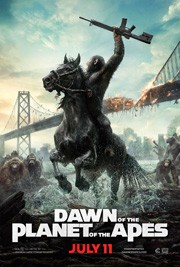We find ourselves in the back half of this summer movie season, and while there are still upcoming movies that need to be accounted for (“Guardians of the Galaxy” and “Sin City: A Dame to Kill For,” to think of a couple), things are starting to come into focus. The highs, the lows and the ho-hums of the movies during 2014 are becoming apparent. Not a moment too soon or too late, though, arrives “Dawn of the Planet of the Apes,” undeniably the most impressive movie Hollywood has offered this summer.
Right from the outset with a title font set in an ominous, crimson blood-red, this sequel immediately distinguishes itself from the first film, “Rise of the Planet of the Apes.” I’m not entirely sure why the first film is “Rise” and the sequel is “Dawn,” because it stands to reason that if anything’s risen then it’s already dawned, but I digress. The first film ended on a relatively hopeful note, in a verdant, green forest with Caesar (played masterfully by Andy Serkis), the hyper intelligent chimpanzee, roaming free with his hyper intelligent family of chimps, gorillas and orangutans in tow.
When we open on the second film, that feeling is all but a distant memory, as if it almost never happened. A virus, dubbed simian flu, resulting from human exposure to a potentially Alzheimer’s curing drug that was being tested on chimps, has nearly wiped out humanity. While human civilization has virtually died, the civilization of apes has risen. Having not had to deal with the threat of humanity for ten years, the apes have constructed a stable colony and a whole way of life in the Muir Forest outside of San Francisco. Caesar, keeping to his namesake, is their leader.
However, a small pocket of humanity is still left in San Francisco, and they stumble upon Caesar’s domain. The group is led by Malcolm (Jason Clarke), who is accompanied by Ellie (Keri Russel), his second wife, and Alex (Kodi Smit-McPhee), his son. They need access to a hydroelectric dam in order to provide power to the hundreds of other humans in an outpost in San Francisco. There’s one problem: The dam is on Caesar’s turf.
Thus begins a series of interspecies miscommunications. What’s fascinating is that the humans need the apes, not the other way around. It’s humbling and perturbing to see humans at the mercy of another animal.
While both leaders, Malcolm and Caesar, are willing to work towards trusting the other party, other forces seek to destroy any agreement. Most notably is Koba (Toby Kebbell), Caesar’s right-hand ape whose mutilated face came at the hand of human lab experiments. He hates humans, and he begins to question Caesar’s motives. Seeds of usurpation are sewn. This is an extremely layered, satisfying plot. When all is said and done with this franchise rebirth, it very well may be remembered as the best saga since “The Dark Knight Trilogy.”
The visual style is darker and more mature than “Rise.” The sun never shines in this world, and it always seems to be raining. Everything is muted and cast in dreary tones, the forest no longer green, but black and impenetrable, like Joseph Conrad’s Congo in “Heart of Darkness.” Cinematographer Michael Seresin was behind the visuals for the film. Seresin held the same position, interestingly enough, on “Harry Potter and the Prisoner of Azkaban,” a turning point in another franchise that transitioned from cheery to somber and serious.
Serkis delivers one of the finest performances of the year as Caesar. His ape walks the line between strength and compassion, anger and patience as he navigates new leadership territory. He commands a presence not only amongst his fellow apes, but amongst humans, too. Serkis wouldn’t have been able to deliver such a performance if it wasn’t for the mind-blowing CG work. Multiple times throughout this movie I questioned, knowing full well that the answer was “no,” whether they were using animals. It is simply photorealistic.
Not only is this film a vast improvement on its predecessor (which was a nice cut above your standard Hollywood blockbuster fare, but nothing phenomenal), all other summer films this year are playing checkers while this one’s playing chess. Let’s just hope the apes don’t beat us at that anytime soon.
Grade:
A









